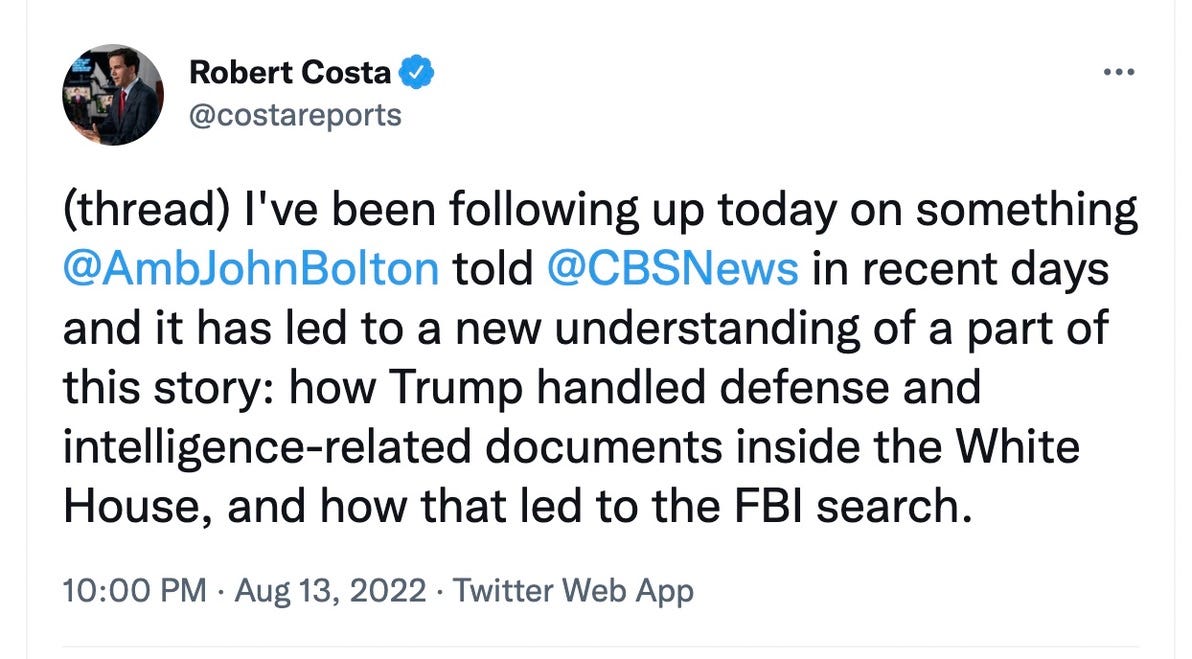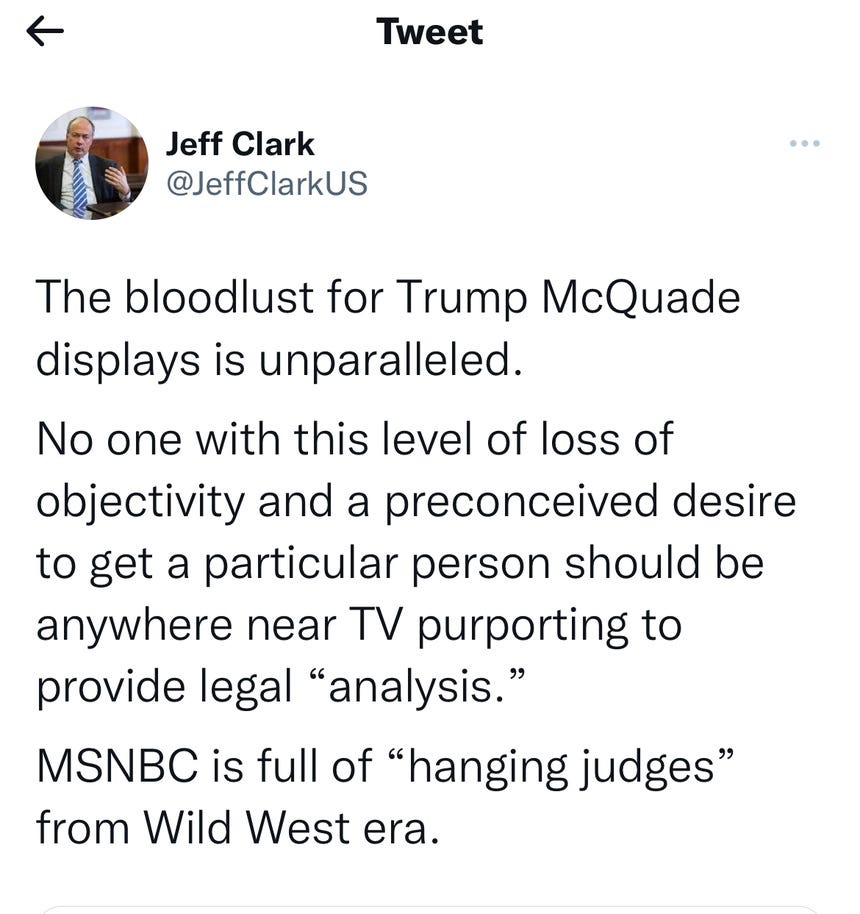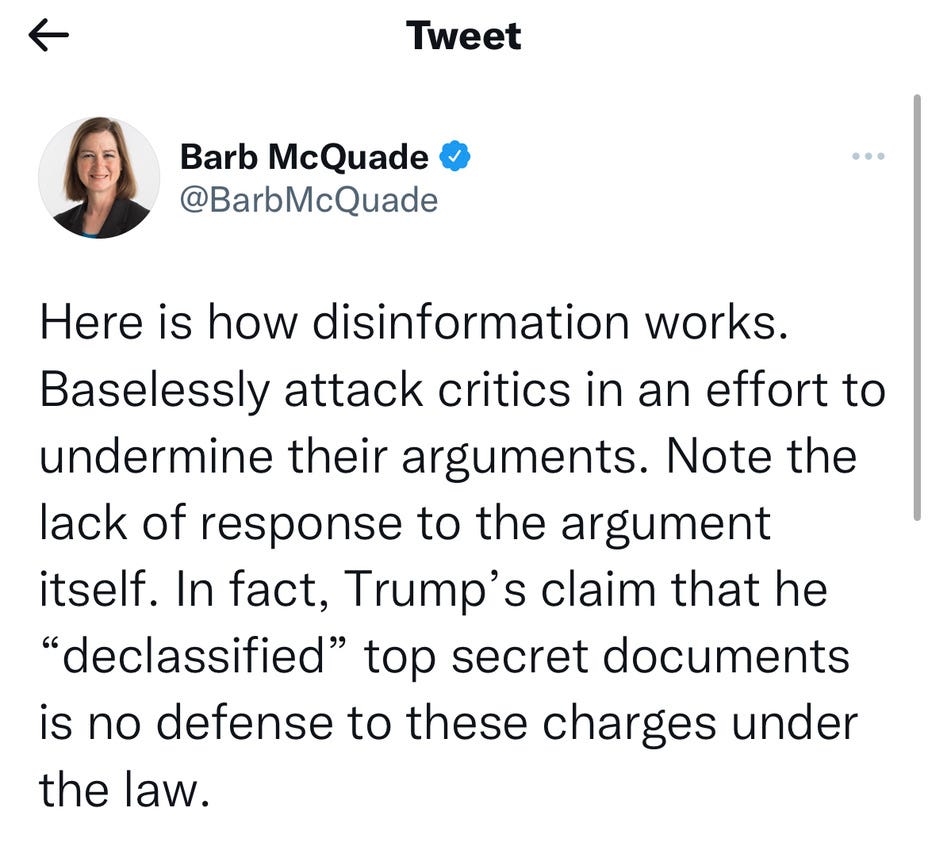The Week Ahead
Sunday, August 14, 2022
Lots of information came out this past week after DOJ executed a search warrant at Mar-a-Lago (MAL) and classified information was recovered. As we head into the new week, let’s sort out some of the confusing pieces:
· Did Trump have an excuse for the FBI finding Top Secret information at MAL? Of course, he did. After trying out a few things along the caliber of “the FBI planted it”, he put out a story through a representative, claiming he waved his magic wand and declassified everything he took out of the White House to work on at the residence. That’s fascinating because it’s an acknowledgment that, with no concern for potential damage to our national security or attempt to seek advice from the authority that classified the information, he removed protections from crucial intelligence.
Leaving aside the shocking (but not surprising) fact that Mr. Trump put his convenience ahead of the nation’s safety and security, this isn’t how declassification works. Even if you’re the president, there are some hoops you have to jump through. An imaginary conversation inside of your own head isn’t enough.
But we don’t need to explore the nuances of declassification. Whether the materials found in Trump’s possession at MAL are classified or not is irrelevant to DOJ’s investigation. We know now, because it was in the search warrant that were unsealed Friday afternoon, that DOJ is investigating three potential crimes. None of them require proof that the documents involved were classified.
DOJ knew all along that Trump would come shooting at them with a declassification defense. They were way ahead of him.
· What are the three crimes under investigation?
1. The Espionage Act, which you can read here. This is a lengthy act and some of the violations involve conduct that isn’t as serious as what we would deem espionage in common parlance. For instance, subsection (d), which is about handling of information related to national defense, makes it a crime for someone lawfully in possession of that information to “willfully retain the same and fail to deliver it on demand to the officer or employee of the United States entitled to receive it.” But it does not require proof documents are classified, only that they relate to national defense. The statute also criminalizes conduct we would more commonly view as espionage, including communication of the protected information to third parties. No evidence (yet) that this occurred here. And nothing in the unsealed search warrant sheds light on what type of conduct DOJ is investigating in connection with materials seized at MAL.
2. A prohibition on concealing, removing, or mutilating any documents/records that have been “filed or deposited” in any public office. Read it here. The government must prove a defendant acted with specific intent, i.e., they must have intended to conceal a document (if concealment is the conduct that is charged). It can’t be an accident or a mistake. Although the law itself doesn’t clearly say that records filed in an office includes documents in a president’s possession, DOJ has long viewed this charge as the correct vehicle for protecting government documents and records.
3. Obstruction of justice. Again, there is no requirement that materials be classified. The conduct proscribed by the statute is knowingly altering, destroying, mutilating, concealing, covering up, falsifying, or making false entries in “any record” intending to “impede, obstruct, or influence” an investigation. Some of the most disturbing news we learned last week came from the New York Times, which reported that after being asked to return classified material earlier in the year, Trump’s team turned over boxes of documents and one (or perhaps more) of his lawyers signed a statement in June affirming all classified material at MAL had been returned. If DOJ can prove knowing and intentional retention of classified materials after this, anyone implicated could (and should) find themselves in the cross hairs of an obstruction prosecution.
· What isn’t DOJ investigating? There was no reference in the search warrant to 18 U.S.C. 1924, which prohibits unlawful removal and retention of classified material. I suspect it’s the requirement that the government prove materials are classified, beyond a reasonable doubt (if charges are ever filed), that led DOJ to conclude it was the better part of wisdom to sidestep that fight. Although there’s no indication DOJ will indict anyone, let alone Trump, as of yet, Trump’s wild claim he had an automatic declassification order in place would only have to persuade one juror to block a conviction at trial. No need to run the risk of having to fend off that defense when you’ve got plenty of statutory authority that lets you get around it.
Even though this statute isn’t part of the investigation, it’s worth noting that Congress amended the law in January 2018, enhancing the penalty to include up to five years imprisonment. In the past, misdemeanor prosecutions occurred under this provision when officials kept classified material and there was a “plus factor” involved. Clinton advisor Sandy Berger was prosecuted for a misdemeanor after he removed several records and destroyed at least one. General Petraeus, who served as CIA Director during the Obama administration, was prosecuted for a misdemeanor when he shared classified material with his girlfriend who was writing a book. It seems to be the existence of some plus factor beyond simply possession of classified material/government records that leads to prosecution.
Trump was so outraged by Hillary Clinton’s “emails” (which turned out to contain a few arguably classified items due to negligence, not intent), that he demanded the penalties for violating this law be increased and Congress complied. DOJ may not be using the statute here, but Trump’s history with it suggests he fully appreciates the law and the seriousness of mishandling information that could damage our national security. We still don’t know for certain if there are any plus factors at play here, but stay tuned because Karma is, in fact, a b****.
So, now we know DOJ believed, and a federal magistrate agreed, there is probable cause to believe three laws have been violated. The unsealed materials don’t identify the subjects/targets of the investigation, but it would defy belief if Trump isn’t somehow in that mix. Robert Costa has a very interesting thread on Twitter that discusses Trump asking for, and in some cases keeping, pieces of paper he wasn’t particularly interesting in reading during classified briefings. If accurate, it puts Trump squarely in the middle of events.
Is DOJ seriously considering prosecution? We don’t know the answer.
But investigators will be hesitant to give the former president the benefit of the doubt a second time for mishandling high level information. Whether Trump declassified it or not, top secret information receives that classification because unauthorized release could do grave damage to national security. Knowing that and given his history of outrage over Hillary’s emails, it would have been incumbent on Trump to order a document-by-document search of his boxes and ensure official records were returned. In May, the talk was of the Presidential Records Act, now it’s of the Espionage Act.
Fortunately, when investigations heat up like this, people with detailed information about criminal conduct (and arguable exposure to responsibility for it) often prefer being witnesses to being defendants. If DOJ succeeds in recruiting witnesses with inside information, the likelihood that the truth will come to light is greatly increased.
We don’t know what, if anything, Trump did with the materials at Mar-a-Lago. But DOJ appears to be interested in that question. For one thing, they’ve obtained video surveillance tapes of MAL. There’s been speculation that the large and seemingly unwarranted investment of $2 billion by the Saudis in Jared Kushner’s new business venture along with the large sums of money paid to Trump to host a Saudi-backed golf tournament could be payoffs. But for now, that is just speculation and I’d encourage you to be careful about buying into conjecture unless and until it’s backed up by evidence—even when the speculation makes a certain amount of intuitive sense.
One more item before we close. The environmental lawyer who wanted to be attorney general is still trying to show off for Trump. He thought he could make up some inane nonsense about my #SistersInLaw podcast co-host and dear friend Barb McQuade, who tweeted an explanation of the classification issue we dove into up above. But Barb wasn’t having any of it and responded with one of the best examples of civil discourse I’ve seen; just the facts and no rancor.
It’s always great to start the new week with a good example!
This is likely to be an interesting and important week. It’s also my first week of teaching for the fall term, so expect me to be a bit more sparring in my posts. But I’ll jump back in as we learn more. If you’re enjoying the newsletter, I hope you’ll share it with a friend. And, I love reading your comments, so please keep it up.
We’re in this together,
Joyce





Thanks for the great explanation Joyce! Good Luck with the new school year! And Mr. Clark is once again way in over his head if he thinks he’s going to outsmart either you or Barb 😁
Barb speaks from the true perspective of the law. There is no law for Trump and the Republicans. They have been pulling these stunts since Nixon. The script was written for this hateful chaos when Nixon was pardoned. I agree with Jill Wine-Banks who was there when it happened. Nixon should have been nailed publicly for his crimes.